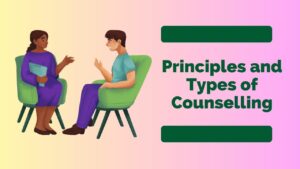The term “Dissemination of Occupational Information” means spreading information related to Occupation. It includes accurate information related to career and job, Roles and Responsibilities, and salary. It also includes useful facts about occupational trends and the supply and demand for labour.
To guide pupils on any educational level and in any area of learning, whether it’s academic subjects, Social Relations, emotional adjustment or the solution or life practical problems, guidance services should be introduced in educational institutions.
Vocational Choice is the most crucial decision in an individual’s life. Since all individuals are not equally endowed with potential and Capabilities, the choice of vocation, therefore, assumes an added significance. Hence, Vocational Guidance is needed while choosing a vocation.
Method of the Dissemination of Occupational Information
There are two ways of Dissemination of Occupational Information to students and individuals desirous of Vocational guidance
1. Providing Vocational Information at the Individual Level
An interview between the candidate and the counsellor can provide vocational information at the individual level. The Candidate Should be provided vocational guidance only about the vocation in which he shows interest. However, care should be taken to ascertain that his choice of vocation matches his capability, qualifications, and interests.
2. Group Method
An interview or personal contact is a good medium of the Dissemination of Occupational Information. However given the limited number of counsellors, constraints of time and funds and a very large number of candidates, personal contact should be made only when information cannot be provided through the group method.
Providing vocational information in Groups can be done in various ways-
- Occupational Information as a Regular Subject: To familiarise students with the real state of the occupational field, Vocational information should be taught as a subject. As a subject, occupational information can be compiled in a more organized way to enable students to make better vocational choices. Moreover, they will receive inspiration for further education.
- Career Conference: Career fairs and seminars play a significant role in the Dissemination of Occupational Information. These conferences are organized at the beginning of the session, on the eve of annual days or at the end of the session. Experienced and Working professionals are invited to address these conferences.
- Display of Posters and Advertisement Clippings: Vocational information can also be disseminated by the display of posters and newspaper advertisement clippings on the School notice boards, in the library, inside and outside the classrooms.
- Display of Charts and Other Printed Materials: Charts, pamphlets and other printed materials can be displayed in classrooms and libraries.
- Through Special Subject Teachers: Teachers connected with vocational guidance can also disseminate vocational information.
- Through Movies and Documentaries: Movies and documentaries are proven and effective means of providing occupational information to groups
- Through Radio and Television: Announcements of vocational information can be made through radio and television, which people can receive while sitting at home.
- Visit Industry and Commercial Establishments: Vocational information can be provided to students more nearly by conducting tours of commercial and industrial establishments.
Essential Aspects of Occupational Information
Before choosing an occupation it is necessary to study it because each occupation has different aspects. For providing vocational guidance it becomes imperative to determine the relevant aspects of an occupation and its suitability vis-a-vis an individual and his needs. Thus, studying the different aspects of occupation is an essential need of the guidance process. The following are the essential aspects of the occupation are-
Importance of an Occupation
Some of the questions to be analysed are:
- How useful is the occupation for the student, society and nation?
- How many people can find employment from it?
- Whether it is a developing occupation or a developed one.
Nature of Work
- What is an individual’s nature of work in a particular occupation?
- Whether it is a desk job?
- Does the occupation involve much travelling?
- Does it involve fieldwork?
Working Conditions
It is important to know working conditions and whether those conditions are congenital or not.
- There is an adequate arrangement for light, air, water etc. and is humidity under control?
- How arduous is the work?
- How many hours does one work? and is it a day shift or a night shift?
- Is there any rest time between work or not?
Requisite Abilities
- What type of abilities are required in the occupation, whether these are physical abilities or mental abilities? or both?
- In certain occupations, physical abilities are required. If the job requires physical ability, it involves the entire body or specific parts of the body like mouth, hands, eyes, feet, etc.?
- If the mental ability is required, what mental level is needed? Mental ability includes visualization, creativity, logic, memory, etc. In certain occupations along with mental and physical abilities, psychological abilities are also needed. for example, the level of emotional maturity, patience, courage, stability, personality, etc.
Entry into Occupation
The mode of joining each occupation is different. Hence, it is necessary to know the mode of joining an occupation. Is it through employment exchange, an application to an employer and a subsequent interview? or through passing an entrance test? In the case of self-employment, the following must be ascertained:
- How much investment is needed at the onset?
- Is any licence or certificate needed for the occupation?
- Is previous experience needed?
- Is there any legal formality to be fulfilled, and if so how much time does it take?
Training Needed
The types of training needed for an occupation have to be ascertained.
- Where is the training available and what is its duration?
- How much experience does the employer need or can the experience be done away with?
Salary
- What is the pay scale in the occupation?
- What is the annual increment?
- What is the highest salary on the scale?
- Are the wages given daily, weekly or monthly?
- Facilities are other than salary, for example, free medical aid, housing facility, servant, telephone, pension, bonus, productivity bonus, gratuity, etc. How much is paid for overtime?
- What facilities are provided in case of working till late?
Chances of Promotion
- Are there chances of promotion in the occupation?
- After what length of service does promotion become due?
- What are the extra qualifications, other than experience, required for promotion?
- The tenure of service?
History of Occupation
Before studying any occupation it is necessary to know its brief history. History of occupation gives information about its beginning, growth, stability and future progress.
The Regularity of Work
- Does work continue through the year?
- Or does it last for only some months or a year?
Place of Posting
Among all aspects of employment, this aspect is most important. An individual must know the possible places where he can be posted, the climatic conditions, temperature, availability and quality of water, language and geographic location.
If while choosing an occupation, an individual considers all the above aspects he will not face any problems in his vocation
Tools for Career Information
Occupational information is collected and updated using the following tools:
- Career Fiction
- Biography
- Occupational monographs
- Occupational Brief
- Occupational Abstract
- Occupational Guide
- Job Series
- Business and Industrial Descriptive Literature
- Occupational and Industrial Descriptive Literature
- Recruitment Literature
- Posters
- Charts
- Article of Reprint
- Community Surveys, Economic Report or Job Analysis
- Audio-Visual Aids
- Computer
Emerging Trends of Occupational Information
Some of the strategies for emerging trends are listed below-
- Screening of career-oriented films, to inform the target groups.
- Organization of career fairs where, apart from the display of career literature, experts are available to clarify doubts on the part of those who participate in the fairs. Of late these fairs have gained immense importance because of their relevance to the present-day context. They are attracting the attention of different strata of society. Many Corporate Houses are coming forward to sponsor such fairs.
- Conducting Rozgar Bazar/Rozgar Mela implies arranging a face-to-face meeting between employers and potential employment seekers to provide an opportunity to clarify each other’s point in arriving at a consensus about the extent of suitability or otherwise on the part of employment seekers.
- Organization of Entrepreneurial Awareness Campus to appraise the potential employment seekers about the existing realities prevailing in the wage-paid labour market and to enable them to have exposure to avenues available in launching their enterprises in terms of Governmental Schemes, Financial assistance available, Traits that are required to take up self-employment, Managerial inputs that are required and so on
In Conclusion, the individual is the best judge in choosing any occupation and the teacher and counsellor are to help him do so. Efforts on providing, and spreading occupational information may have been attempted to provide relevant information about employment to the young. This is crucial on the other hand because every student should know the opportunities available.
Career Counselling
Career counselling is a type of advice-giving and support provided by career counsellors to their clients, to help the clients manage their journey through life, learning and work changes (career). This includes career exploration, making career choices, managing career changes, lifelong career development and dealing with other career-related issues. It also helps to Know and Understand yourself and the world of the work to make career, educational and life decisions.
In recent times, Career Counselling has got the recognition it needs. Career Counselling in India had never been much popular amongst the students. However, People like parents or Students now become concerned about their career choices due to unsuccessful jobs and stressful lifestyles.
Meaning & Definition of Career Counselling
Career counselling refers to that professional relationship where the clients are helped to select, prepare to enter and function effectively in an occupation. OR
A largely verbal process in which a counsellor and counselee are in a dynamic and collaborative relationship, focused on identifying and acting on the counselee’s goals, in which the counsellor employs a repertoire of diverse techniques and processes, to help bring about self-understanding, understanding of behavioural options available, and informed decision-making in the counselee, who has the responsibility for his or her actions
- Tolbert (1972) defines counselling as a personal, face-to-face relationship between two people, in which the counsellor, through the relationship and his special competencies, provides a learning situation in which the counselee, a normal sort of person, is helped to know himself and his present and possible future situations so that he can make use of characteristics and potentialities in a way that is both satisfying to himself and beneficial to society, and further, can learn how to solve future problems and meet future needs
- According to Brown and Brooks, “Career counselling is an inter-personal process designed to assist an individual with career development Problem”
- Carl Rogers, “Counselling is a series of direct contacts with the individual which aims to offer him assistance in changing his attitude and behaviour”
- Blackham (1977) suggests that “counselling is a unique helping relationship in which the client is provided the opportunity to learn, feel, think, experience and change in ways that he or she thinks is desirable.”
- Cottle and Downie (1970) define counselling as “the process by which a counsellor assists a client to face, understand, and accept information about himself and his interaction with others so that he can make effective decisions about various life choices.”
Aim and Objective of Career Counselling
The main aim and objective of career counselling are as follows:
- To help individuals with career planning, the decision-making process, implementation of career choice, career adjustment, and the interplay between career and personal issues.
- To help students fully engage in career planning
- To develop a positive attitude towards study and work
- To understand and develop the skills that are required to be successful in future planning
- To provide students with a comprehensive understanding of opportunities at key transition points and translate these effectively into appropriate decisions and actions.
- Learning about careers and the world of work
Importance of Career Counselling
Career counselling is very important for students, especially in today’s generation where one needs to be abreast with a lot of knowledge concerning information technology and besides the process of globalization where one needs to be equipped with employable skills
- It is important so it helps to understand one’s strengths and weaknesses concerning their present course of the profession and gives them the knowledge to know what career should be suited.
- It gives a platform to voice their opinion about what they would like to pursue as well as discuss the obstacles that they may be worried about.
- Career Counselling makes the transition from one field to another a non-stressful event.
- It offers value, knowledge, skills, and resources to help one understand life factors that influence one’s aspirations in positive and negative ways.
- After attending a career counsellor one can make an informed decision about their future career and education
The Need for Career Counselling
All of us require career guidance at some point in our life. It helps us to get insights about ourselves, our careers and what we can do to improve it.
- It helps us to pick the right career from all the available and relevant options.
- It is needed as it helps to attain confidence and future insight and understanding of the hurdle in his or her career option.
- It helps in changing unwanted behaviour. For example Drug abuse, Smoking, drinking etc.
- It helps us to provide expert resources and to have access to the knowledge that a career expert processes.
We can conclude from the above point that students and others seeking Career counselling benefit from it as it helps in recognizing students’ strengths, Capabilities, Potential and possible careers through more creative and interactive tools.
Career counselling benefits are quite vast. The individual will be guided on the right career path as he or she can make a balance and perfect stability between personal and professional life. So Career counselling is very important for every individual in his/her every aspect of life from childhood to Old age.
References:
- Kinra, A. Guidance and Counselling (1st ed., pp. 110-115). New Delhi: Pearson Education
- Occupational Information. (2020). Retrieved 28 May 2020, from http://egyankosh.ac.in/bitstream/123456789/46278/1/Unit-10.pdf
- Education, M. (2020). Career Counselling & Career Guidance from India’s Top Career Counsellors – Mindler. Retrieved 28 May 2020, from https://www.mindler.com/
- Career counselling. (2020). Retrieved 28 May 2020, from https://en.wikipedia.org/wiki/Career_counseling
- Retrieved 28 May 2020, from http://ncert.nic.in/textbook/pdf/lehe108.pdf
- Seddoh, K. (2002). Handbook on Career Counselling (p. 5). Paris: The United Nations Educational, Scientific and Cultural Organization


